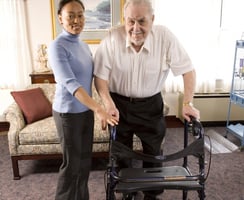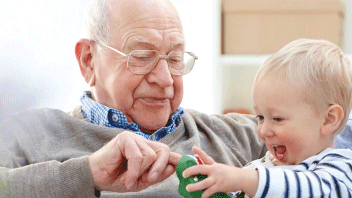Occupational therapy is a medical treatment to develop, improve, or maintain skills of daily living...
When is home health the right option?
After a long hospital stay, patients are eager to get home. But the experience often can leave them feeling weak after battling an illness or accident. Poor sleep, lack of movement, and being away from home are some of the most common causes. This is why a good after care plan is crucial to keeping them on the road to recovery.
Typically upon discharge, doctors make sure that patients have the medications and services to help them return home safely, which can include therapy and/or nursing services such as inpatient rehab or skilled nursing.
However, if a patient has an involved and engaged friend or family member who is able to help, they may be able to go home with home health services. While most patients would prefer this option, family involvement is critical for home care to work.
“To qualify for homecare, we frequently ask if a patient has a caregiver that can be taught and is willing to learn how to care for the patient because home care cannot replace the 24-hour nursing care that they would get at inpatient rehab or in a skilled nursing home,” said Ryan Shifley, executive director of strategy for Visiting Nurse Association of Ohio.
Shifley points out that most skilled home health is covered by Medicare and insurance. In addition, he explained that patients do not always need a qualifying hospital stay or event to be eligible for it. In fact, sometimes the doctor can make a referral to home care during an office visit, before an accident or crisis occurs.
“Doctors frequently see patients who are at high risk of falling or being hospitalized,” he said. “Home health is a great way to have a trained medical professional be their eyes and ears at home and pre-emptively help the patient avoid going to the hospital or get weaker. Home care is often an easy and less expensive option.”
For VNA patient Dave Curran, home care was the right choice after two hospital stays within several months. At age 93, he suffered a fall in the bathroom and soon after had to be readmitted for complications from chronic obstructive pulmonary disease, or COPD, an inflammatory lung illness. Both times, rehab was initially suggested to him upon discharge. However, Curran’s living situation was appropriate for home care, thanks to help from his wife, Judy, and his supportive adult children.
Curran is glad he spoke up for home care.
“It was a good choice, I’m much better off going home,” he said. “What was I going to do in a rehab place overnight? I would be laying down too much. At home, I’m always moving around, I never stop – I’m taking out the rubbish or checking the mail.”
Upon returning home after his fall, Curran received home visits from a nurse, as well as physical and occupational therapists to help with strength, balance, and bathroom safety.
His wife, Judy, always stayed close by when they visited.
“She is here when they are here. She listens and asks questions. She watches what the PT says and asks me, ‘Are you doing it,’” said Curran.
After his second hospital visit for COPD, doctors recommended that Curran go home with oxygen to help with his breathing. And once again, he was able to have a home care nurse work with him on how and when to use the oxygen.
“It’s all new to me,” he said. “They helped me learn to manage my COPD and how to work the oxygen. The VNA of Ohio nurses are always pleasant without exception and give me suggestions on breathing exercises to increase my lung volume.
“It’s much less stressful with home care -- you can recuperate at your own pace, and you get one-on-one instruction,” he added.
Adult children like it too, because someone is checking up on their parent. It also greatly reduces the stress of getting to a doctor’s appointment.
“I just would not do it,” said Curran. “Driving and parking at the doctor’s office…I could be out of breath just getting up there.”
VNA of Ohio is a pioneer in home care. Founded in 1902, its team of nurses and therapists have a long history of supporting people where they are most comfortable: in their own homes. For more information about VNA homecare, please call (216) 931-1300.


